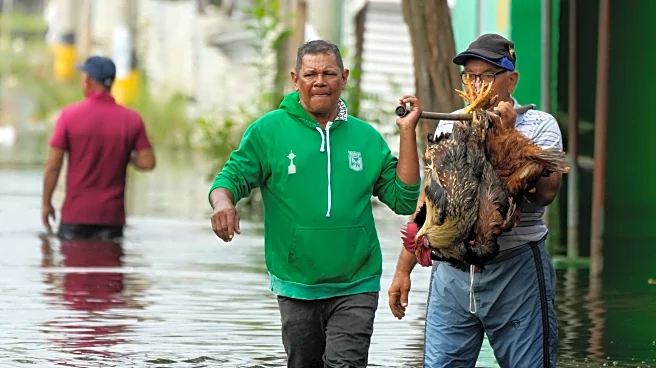Rapid Read • 8 min read
Wildfires across the eastern Mediterranean have intensified due to soaring temperatures and strong winds, resulting in the deaths of a dozen individuals in Turkey and Cyprus. In Turkey's Eskisehir province, ten forest workers and search and rescue volunteers perished, while 14 others were hospitalized after being trapped by rapidly shifting flames. Cyprus reported two fatalities and ordered evacuations as approximately 100 homes were destroyed. The heat wave, fueled by Saharan air, has seen temperatures reach up to 50C (122F) in southeastern Turkey, igniting nine major wildfires in a single day. The Mediterranean region, historically prone to wildfires, is experiencing increased threats due to climate change-induced extreme weather patterns. This summer, heat waves have temporarily closed tourist attractions like the Eiffel Tower and the Acropolis, disrupted transport, and posed health risks to millions.
AD
The intensifying wildfires in the Mediterranean highlight the growing impact of climate change on extreme weather events, posing significant risks to human life, infrastructure, and ecosystems. The situation underscores the urgent need for enhanced fire management strategies and international cooperation in firefighting efforts, as evidenced by Spain and Jordan's assistance to Cyprus. The economic implications are substantial, with potential disruptions to tourism and agriculture, particularly in regions like France where thunderstorms and floods threaten grain and wine production. The broader European landscape is increasingly vulnerable to wildfire risks, necessitating adaptive measures to protect communities and mitigate environmental damage.
As temperatures continue to rise, fire risks are expected to increase across Greece, with strong winds forecasted to exacerbate the situation. Authorities are escalating weather warnings, and firefighting efforts are being bolstered with additional aircraft. A change in weather patterns is anticipated to bring some relief by early August, potentially reducing the immediate threat. However, long-term strategies will be essential to address the evolving wildfire dynamics and safeguard affected regions. The focus will likely shift towards improving land use planning and enhancing community resilience against future climate-related disasters.
The Mediterranean wildfires serve as a stark reminder of the broader implications of climate change, which is transforming many regions into high-risk landscapes for wildfires. Human development patterns and land use changes are increasing vulnerability, necessitating a reevaluation of ecological and urban planning practices. The situation calls for a deeper understanding of fire ecology and the integration of climate adaptation strategies into policy frameworks to ensure sustainable development and environmental protection.
AD
More Stories You Might Enjoy












